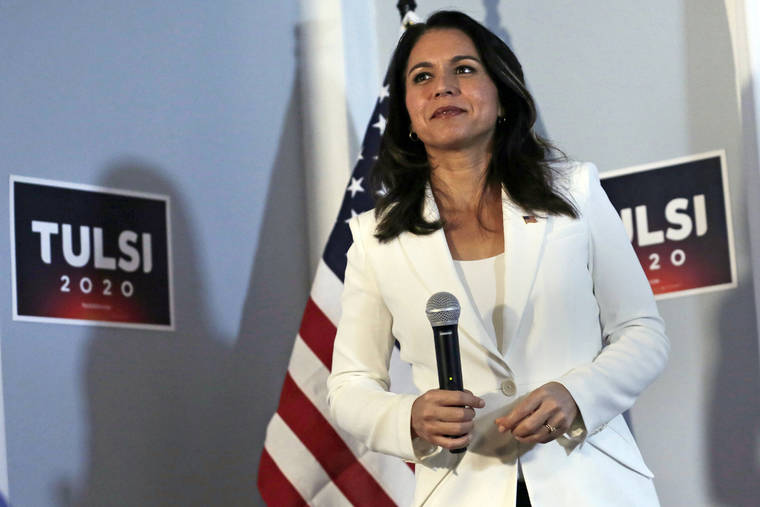HONOLULU — In recent days, U.S. Rep. Tulsi Gabbard has talked to voters over chili and pumpkin bars at a house party in Cedar Rapids, Iowa. She sat down with students at Franklin Pierce University in Rindge, New Hampshire. She packs her schedule with gatherings in both states as she tries to lift her long-shot presidential campaign.
Back home some 5,000 miles (8,000 kilometers) away in Hawaii, a state senator eying her House seat has been hopscotching across the verdant, mountainous islands that make up her mostly rural congressional district. The campaign Kai Kahele is building for Congress is putting Gabbard’s day job in jeopardy as she fights to break through a crowded Democratic presidential primary field.
Kahele said the people of Hawaii’s 2nd congressional district need a representative who will work for them full-time and come back to Hawaii for town halls.
“It’s tough for them to see their representative in Iowa, or New Hampshire, or having pizza in California, when they’re struggling at home and they want somebody who is fighting for them,” Kahele said.
Gabbard hasn’t indicated whether she will run for re-election. Her campaign didn’t respond to multiple requests for an interview about her campaign strategy and plans.
If she does run for Congress again, Kahele, a fellow Democrat, would be the most formidable challenger she’s faced for the House seat she’s occupied since 2012.
The 45-year-old Native Hawaiian is a combat veteran and pilot for the Hawaii Air National Guard. He flies passenger jets for Hawaiian Airlines and is a member of the pilots union, a helpful attribute in union-friendly Hawaii. He played on the University of Hawaii volleyball team that made it to NCAA championship finals in 1996, a bonus in a state where volleyball is among the most popular collegiate sports alongside football.
He’s picked up endorsements from three former governors and the chairman of the Honolulu City Council since declaring his candidacy earlier this year.
In recent days he’s been meeting with nurses on Maui, joined an LGBTQ meet-and-greet in Honolulu and celebrated Rosh Hashanah with a synagogue on the Big Island.
He said voters in the district are concerned about the high cost of living, jobs and the ongoing homeless crisis affecting many islands. He vows to work with federal agencies to secure funding for affordable housing in the district. He supports a single-payer, “Medicare-for-all” health care insurance that would reduce the cost of prescription medication and eliminate all co-pays and deductibles.
It’s not clear how long Gabbard, who is also a combat veteran from her time in the Hawaii Army National Guard, plans to keep up her presidential bid.
In addition to polling poorly, she’s raising a fraction of the money hauled in by bigger names.
On Thursday she said she was considering skipping Tuesday’s Democratic presidential debate even though she just recently qualified for it after securing 2 percent support in a New Hampshire poll. Gabbard said she objected to the Democratic National Committee’s use of polling to determine who may participate. She also complained the debates were “meant to entertain, not inform or enlighten.”
Longtime allies say she doesn’t dwell on her low poll numbers. More important, they say, is the fact that her campaign gives her a national platform to talk about ending what she calls “regime-change wars” and supporting military veterans.
Gabbard, 38, often speaks passionately about how deploying to Iraq with the National Guard brought her face to face with the high cost of war. She’s said leaders in Washington failed to think about the consequences of war.
“People need to understand why she’s doing this. It’s very important, because it’s not for her. It’s for the honor of the many people that she represents that have suffered in a lot of these different wars,” said Kymberly Marcos Pine, a supporter and member of the Honolulu City Council.
Pine thinks Gabbard will stay in the presidential race so long as she’s able to raise money to spread her message.
Linda Wong, a supporter since Gabbard ran for Honolulu City Council in 2010, said Gabbard is buoyed by the response she gets at town hall meetings. People like her anti-war message at a time when foreign policy hasn’t gotten much attention from other candidates, Wong said.
Back home, foreign policy is unlikely to play a big role in a primary contest for Congress, said Neal Milner, a former University of Hawaii political science professor.
“I don’t think you can assume that most people really know that much about her ideas about regime change,” Milner said.
Colin Moore, director of the Public Policy Center at the University of Hawaii, said Gabbard faces major obstacles in the presidential race as a relatively unknown junior member of Congress from Hawaii.
Moore gives her credit for already making it farther than most thought she would and doubts she’ll qualify for the November debate.
“But Tulsi Gabbard, I think her strength and her signal weakness is she doesn’t really follow conventional political wisdom,” Moore said.



Exactly what this country needs for a leader, a democratic woman from Hawaii, *hysterical laughing* I’d rather have Obama back.
IF i vote, Gabbard would be an EXcellent choice! She using the same terminology, i used, running for Kauai Mayor 2018. “Boycott rigged voting”. These three words are key, however, voter wannabee are Not paying attention, outnumbered by u.s. standards, All day, every decade for 13+ of these last scams. Wake and smell the rich brew of Kauai Cope!